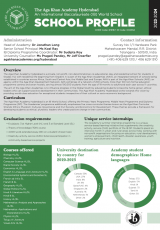Forgetting the unforgettable: Mr. P Sainath at the Hyderabad Literary Festival
Mr. P Sainath’s contention that “Among the 25 crore households in Modern India, each one has a story to tell” makes me realise that each family does indeed have a story - one of struggle, one of resistance, one that is probably forgotten. Why is it that a few handpicked people taste the glory of leading India to freedom? Why were some stories buried while others were praised and celebrated? Is the blood of one freedom fighter deemed trifling over another? Who gets to decide what story to tell? These are a few questions that I pondered over as I listened to Mr. P Sainath speak in his panel discussion with Ms. Sunita Reddy at the Hyderabad Literary Festival 2023. As the discussion unfolded, it took me back to what Tara Westover wrote in her Memoir ‘Educated’: “What a person knows about the past is limited, and will always be limited, to what they are told by others.” The 45-minute panel discussion brought up conversations around the nature of biases, marginalisation of historical knowledge and the ethics of representation of history that we were recorded; sadly, a mere grain of sand in the Sahara!
The discussion began around Mr. Sainath’s recent book, The Last Heroes: Foot Soldiers of Indian Freedom, the collection of stories of the lesser - known warriors of the Indian Independence movement - the housewives, the farmers and everyone in between. These are the people who sacrificed everything but got nothing in return - not fame, not positions, not acknowledgement. They all drifted into oblivion. Listening to Mr.Sainath, the widely acclaimed Indian author of Everybody Loves a Good Drought and the Founder of People’s Archive of Rural India (PARI), speak about ‘the marginalised voices’ sparked ideas and questions I had considered but never felt deeply and voiced out.
Of the 15 stories that were unfolded in The Last Heroes, ‘In Telangana, a quest for Swarajyam’ resonated with me. It was the story of a woman, Mallu Swarajyam, who began her fight for independence at the age of 13 and fought for the Indian Communist Party with just a slingshot. “The Sling shot was my Weapon, the cell phone and laptop are yours” These were the words of Swarajyam during a conference in 2014. The quote gave me an epiphany. I realised the significance of the otherwise banal objects I use daily. They aren’t mere possessions, they are portals to a world of change. I reconsidered how I used the devices that I was privileged to possess. Did it bring value to me or my purpose? Did it bring me joy? I pondered over these questions every time I found myself scrolling mindlessly on social media, most of the time, the answer was a 'no'. I turned more conscious of the media I consume and understood the power of the cellphone we hold in our palms.
In retrospect, I found parallels between what we discussed in Theory of Knowledge and what had been discussed on the panel, conversations that questioned the acquisition of knowledge and the power to desiccate and erase it. The reality is, the answer to each above-mentioned question lies in the thirst to know one’s motherland; the full story of it, not just the most glorious and glamorous, but the bad and the ugly. For most of us, history had been instructed in lessons- digestible dates, facts and names, not as stories as it was meant to be taught. My first introduction to the Independence movement was long before a textbook taught me. It was those stories of my grandmother’s father and the man before him. Those stories educated me about the fact that India wasn’t built on the pillars of the celebrated victors but on the whole foundation of people. But how are we to know the under-represented heroes, their stories slowly fading into nothingness? Names like Nehru and Gandhi are the epitome of the freedom struggle. However, there were millions who were written down in a 'history' book that never existed!
Amulya Madasu, Diploma Programme 1





